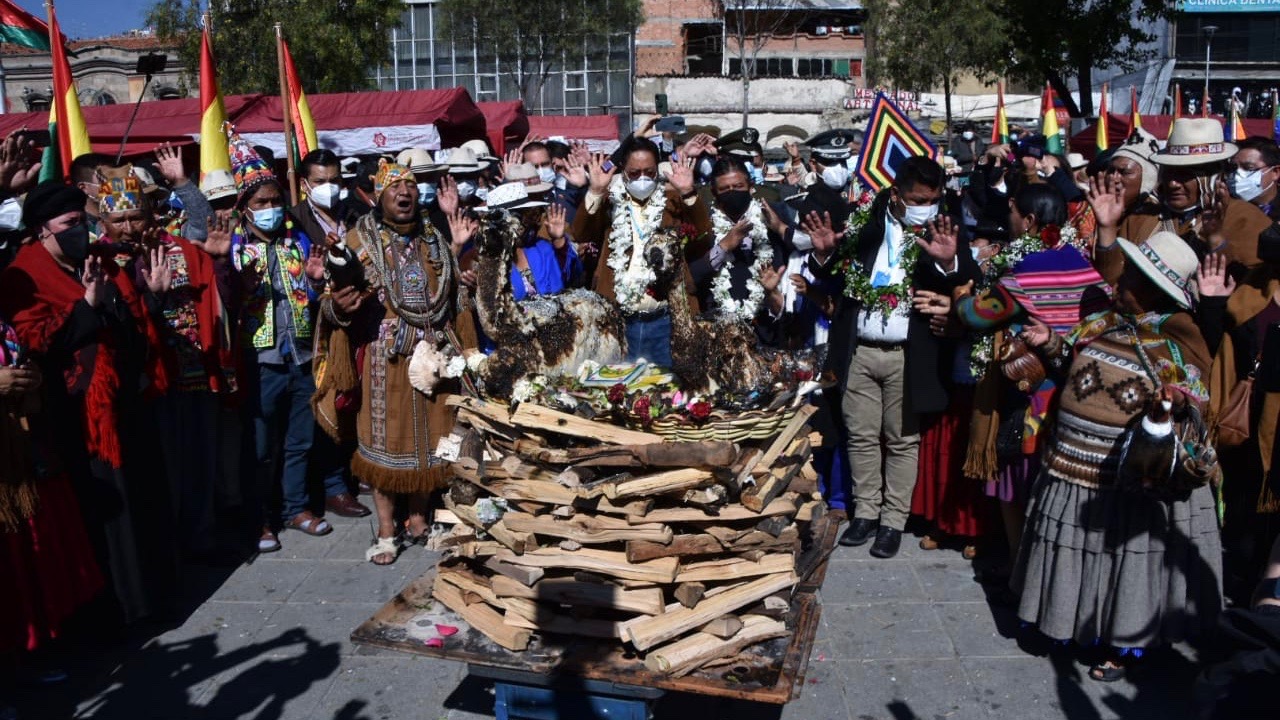On April 22, in commemoration of the International Mother Earth Day, Bolivia organized a series of events under the banner of “Reunion with Mother Earth.” In the morning, at the San Francisco Plaza in the capital La Paz, President Luis Arce inaugurated “Our Mother Earth Fair”, where local producers offered organic food, natural medicines and handicraft products. During his inauguration speech, President Arce ratified the country and the government’s commitment to fight against climate change and protect the rights of Mother Earth.
President Arce announced the reactivation of the Plurinational Authority of Mother Earth (APMT) to promote climate change adaptation and mitigation programs as well as the generation of clean energies through photovoltaic, wind and renewable diesel projects. “The protection of the environment and the conservation of natural resources are essential,” stressed the president.
The head of the state reported that the government is working towards the reactivation of the Peasant-Native Indigenous Intercultural Platform, so that social organizations, both in rural and urban areas, can give their proposals, visions and alternatives through this platform for the care and preservation of the environment. The president said that peasants and Indigenous people “are the ones who live directly with the Pachamama (Mother Earth)” and they “must lead actions against climate change.”
President Arce also announced the approval of two decrees related to the protection of nature. One of them is dedicated to the protection of national wildlife and the other repealed the decree approved during Jeanine Áñez’s de-facto government that permitted an uncontrolled use of genetically modified seeds for five crops: corn, soy, wheat, sugar cane and cotton, threatening not only the food sovereignty but biodiversity of Bolivia.
Proteger la fauna silvestre es de interés nacional, por lo que aprobamos el DS 4489 para asegurar su bienestar, conservación y preservación, respetando su derecho a vivir libre en su ambiente aéreo, acuático o terrestre, y a reproducirse en su medio natural. #DíaDeLaMadreTierra pic.twitter.com/ShF6j6R0Ri
— Luis Arce Catacora (Lucho Arce) (@LuchoXBolivia) April 22, 2021
Abrogamos los decretos supremos del gobierno de facto que ilegalmente autorizaban transgénicos, atentando contra la soberanía alimentaria, el patrimonio genético de nuestra #Bolivia, la biodiversidad, los sistemas de vida y la salud del pueblo boliviano. #DíaDeLaMadreTierra pic.twitter.com/jCAYkTQUTF
— Luis Arce Catacora (Lucho Arce) (@LuchoXBolivia) April 22, 2021
Later that day, an international event was organized, which continued on April 23, and was joined by social and political leaders from across the world. During the event, Bolivian Vice-President David Choquehuanca denounced capitalist onslaught on the environment and said that “Mother Earth is threatened by savage capitalist development.” He stressed that “we need laws and regulations to stop those who have unlimited greed, which leaves the great majority in misery, extinguishes the other species and destroys the only thing we have, our home.” He urged the UN Secretary General António Guterres to convene an urgent Earth Assembly to analyze the impacts of capitalism.
Venezuelan Foreign Minister Jorge Arreaza, who also took part in the event, condemned the capitalist economic systems, which turn nature into merchandise. He said that “the capitalist system does not guarantee the fulfillment of the objectives that the world has before it, since it only applies cosmetic and palliative solutions to these problems,” and called for reconciliation of connection with nature.
#EnFotos 📸 | Segmento de Alto Nivel del Reencuentro con la Madre Tierra: “La Naturaleza de la crisis y la Madre Tierra” #ReencuentroMadreTierra pic.twitter.com/xPL41INpck
— Cancillería Venezuela 🇻🇪 (@CancilleriaVE) April 23, 2021
Former President Evo Morales, in his message on the significant day on Radio Kawsachun Coca, said that “the struggle for the rights of Mother Earth is an anti-capitalist and anti-imperialist struggle.” He proposed an international pact to protect the environment on the basis of social justice and reconnecting with Indigenous ancestral culture and knowledge. “Either capitalism dies, or Mother Earth dies. We are all the children of Mother Earth. That’s why we are all brothers and sisters and that’s why we have a generational responsibility to protect her,” emphasized Morales.
12 years ago, in 2009, the United Nations General Assembly proclaimed April 22 as the International Mother Earth Day through Resolution A/RES/63/278, led by the Plurinational State of Bolivia under Morales’ presidency. This advance allowed the recognition of the Earth and its ecosystems as “our common home” and that “it is necessary to promote harmony with nature in order to achieve a fair balance between the economic, social and environmental needs of the present and the future.”
International Mother Earth Day reminds us of the importance of our planet and the balance of its ecosystems in sustaining life. It is also a day of reflection to act in favor of nature.





